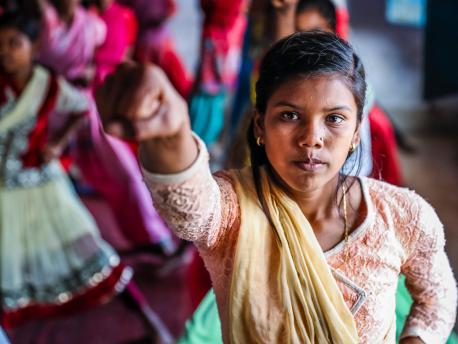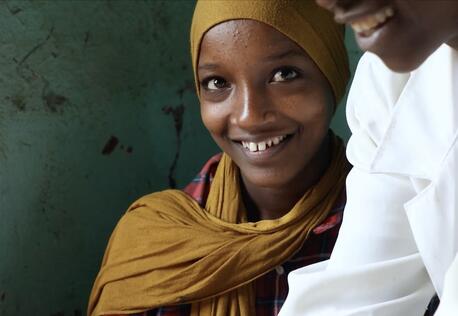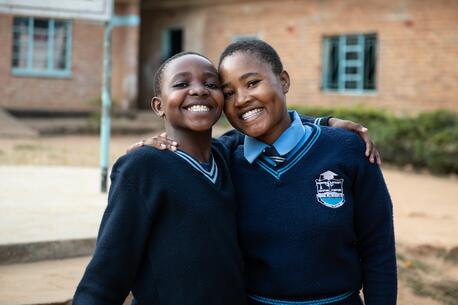
UNICEF and Dove Team Up To Empower and Educate Girls
Self-esteem and body confidence training helps girls around the world build self-assurance and reach their full potential.
Given the right tools and opportunities, there's no limit to what the world's 600 million girls can accomplish. But poverty, violence and lack of education disproportionately affect girls — and to make matters worse, research indicates that a majority of girls around the world grow up believing their future success hinges on their personal appearance.
Pervasive marketing messages in a globalized economy have added an extra layer to traditional pressures on girls to conform to certain standards of beauty, and the negative effects on their personal development can be long-lasting. Research indicates, for example, that girls in countries as far-flung as China, the United States and Finland who think they are overweight — regardless of their actual body weight — achieve poorer grades in school than girls who say they are comfortable with their looks.
Research shows that girls around the world feel pressure to conform to certain standards of beauty
UNICEF works around the world to protect, educate and empower girls. Quality education offers children a ladder out of poverty and a path to a promising future. Girls who complete school are less likely to be forced into early marriage and less likely to experience intimate partner violence. They're more likely to have healthier children, and to make sure their children get an education.
That's why UNICEF and Dove are teaming up to help 10 million young people in Brazil, India and Indonesia gain better self-esteem and body confidence by 2022. The partnership, announced at the Women Deliver Conference in Vancouver on June 5, will adapt modules on self-esteem and body confidence from the Dove Self-Esteem Project, founded in 2004 to deliver body image education to girls globally, and integrate them into UNICEF's Life Skills Programs used in schools and teacher training colleges and on digital platforms.
Developed with psychologists and educators, the modules are designed to encourage girls to live up to their full potential and stand up for their rights. Exercises help to defuse appearance-related anxiety and insulate them from negative social conditioning that gives boys higher status than girls.

Self-esteem training encourages girls to be strong, adventurous and fearless. Above, Unilever employees discuss self-esteem and body confidence with a classroom of girls in Sao Paulo, Brazil. © Marco Estrella
In 2017, the Dove Global Girls Beauty and Confidence Report surveyed 5,165 girls between the ages of 10 and 17 in 14 countries. The findings support decades of academic research showing that body image concerns affect key areas of girls' lives, including their health, education, work and relationships:
- 7 in 10 girls with low body esteem fail to assert themselves or ask for help in school
- 8 in 10 girls who are unhappy with their looks have put their health at risk, for example by neglecting to go to a doctor's appointment
- 5 in 10 girls uncomfortable with their appearance have stopped eating, binged or skipped meals
- 7 in 10 girls think too much importance is placed on beauty as a source of happiness

At the June 2019 Women Deliver Conference in Vancouver, UNICEF Executive Director Henrietta Fore and Unilever CEO Alan Jope announced a new partnership to deliver self-esteem and body confidence education to 10 million young people in Brazil, India and Indonesia by 2022. © Sandra Steier Photography
Self-esteem training helps girls move confidently in the direction of their dreams
"The Dove Self-Esteem Project has reached 35 million young people and we are very happy to be partnering with UNICEF to empower 10 million more young people, especially girls," said Alan Jope, CEO of Unilever, Dove's parent company. "Issues with self-esteem and body confidence can have serious implications for girls' development, so it is critical that we work to address them and help girls become the leaders of tomorrow."
Young people are some of the world's best advocates, creators and thinkers. Yet feelings of disempowerment, low self-esteem and a lack of confidence too often prevent them from speaking out, standing up for what they believe in and reaching their full potential.
"Young people are some of the world's best advocates, creators and thinkers. Yet feelings of disempowerment, low self-esteem and a lack of confidence too often prevent them from speaking out, standing up for what they believe in and reaching their full potential," said UNICEF Executive Director Henrietta Fore. "Through our new partnership with the Dove Self-Esteem Project, we are hoping to change that."
Learn more about UNICEF's work to empower girls worldwide.
Top photo: In December 2016, girls attend Karate classes in the village of Madanpur in India's Jharkhand State as part of a UNICEF-supported adolescent empowerment program aimed at preventing child marriage and encouraging girls to reach their full potential. © UNICEF/UN061998/Vishwanathan
HOW TO HELP
There are many ways to make a difference
War, famine, poverty, natural disasters — threats to the world's children keep coming. But UNICEF won't stop working to keep children healthy and safe.
UNICEF works in over 190 countries and territories — more places than any other children's organization. UNICEF has the world's largest humanitarian warehouse and, when disaster strikes, can get supplies almost anywhere within 72 hours. Constantly innovating, always advocating for a better world for children, UNICEF works to ensure that every child can grow up healthy, educated, protected and respected.
Would you like to help give all children the opportunity to reach their full potential? There are many ways to get involved.





